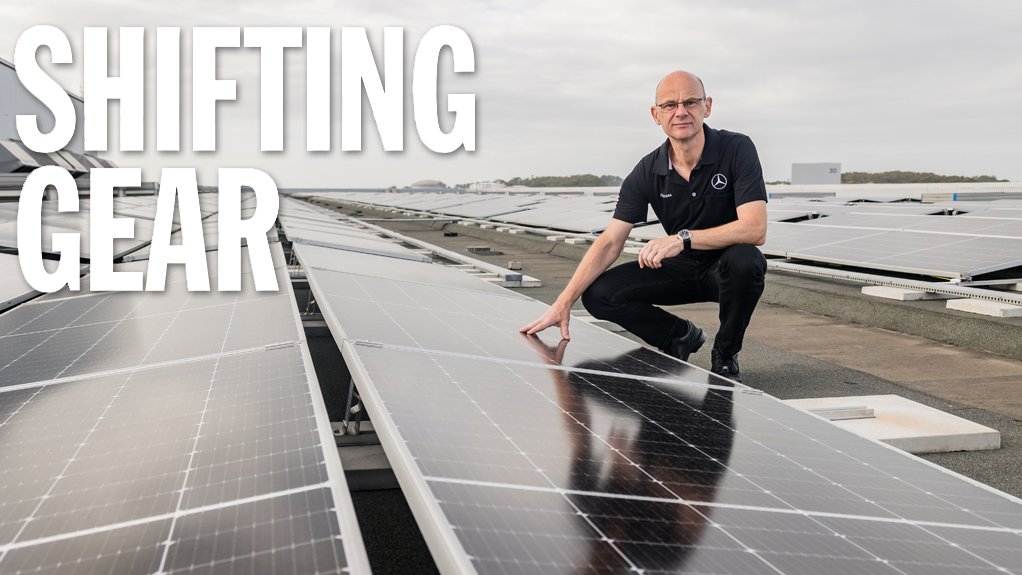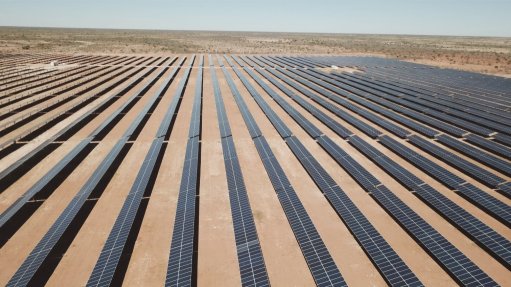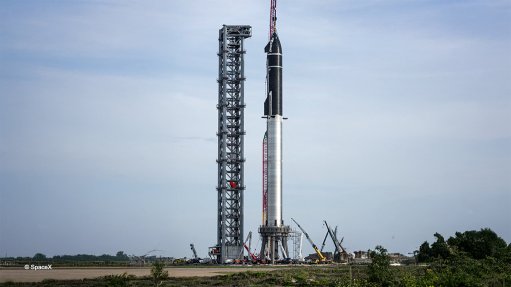Mercedes-Benz to make second hybrid in SA, but competitiveness concerns mount
Mercedes-Benz South Africa (MBSA) will add a second plug-in hybrid electric vehicle (PHEV) to the production line-up at its East London plant this year, says CEO Andreas Brand.
The 50-year-old Brand took over at the helm of the local arm of the German premium car manufacturer in May last year.
The second hybrid to be made in the MBSA plant will be the prestigious C63 AMG PHEV, and MBSA will meet 99% of world demand, with Bremen, in Germany, to fill the gap.
The performance PHEV will be the only C63 model available in the world, and will also be on offer in South Africa, despite the fact that the standard C-Class PHEV model made here is not on sale locally.
MBSA was the first to produce a hybrid in South Africa when it started with production of the previous C-Class PHEV in 2016.
Assembly of the new C-Class kicked off in 2021 – the fifth C-Class sedan to be produced at East London.
Despite the good news of an added derivative – and a coveted new-energy vehicle to boot – Brand voices his concern over the number of infrastructure challenges the carmaker faces, most notably water supply, loadshedding and the performance of the country’s ports.
These factors all play an important role in South Africa’s competitiveness when measured against other production nodes, especially when vying for the right to build what is widely seen as the imminent future of the automotive industry – the electric car.
Brand New
Brand was the head of production and capacity planning at Mercedes-Benz before he was announced as the new MBSA CEO.
He joined Mercedes-Benz in 1997 as production engineer.
His international management experience includes stints at the Tuscaloosa plant, in the US, and the Hungary plant, in Europe, as well as at the MBSA plant in East London (from 2006 to 2008). In 2018, Brand became chief production engineer for the compact car platform within Mercedes-Benz.
On a more personal level, Brand is a passionate runner, and even though he does not yet have the Comrades under his belt, he has completed the Cape Town marathon.
Brand says he was happy to return to South Africa when the opportunity arose.
He is the CEO at MBSA, along with his German colleague, Mark Raine, who focuses on the sales and marketing functions. However, Brand is the one “who signs off on company matters”.
“We have two locations. Mark runs everything related to the Pretoria operations and I run everything related to the plant, which employs around 3 000 people.”
Plant Challenges
The East London plant operates 24 hours a day, five days a week.
Numbers from Naamsa | The Automotive Business Council show that the company exported about 85 000 units last year. Production at East London reached roughly 93 000 units.
About 90% of the company’s production volumes are shipped to 80 markets worldwide.
Brand notes that last year’s production output was much better than 2021, with 2021 numbers hit by the Covid-19 pandemic, as well as the run-out of the previous C-Class.
Building new cars is currently not an easy job, no matter where you are in the world, notes the MBSA CEO.
“In production, you always seek improvement. That said, I am proud of where we are currently at East London, although I would have preferred to have avoided some of the interruptions we have seen.”
Brand says the persistent semiconductor shortage already reared its head before Covid-19 struck in 2020, as computer chip production could not keep pace with rising vehicle output, with the pandemic only serving to exacerbate the situation.
Current global component shortages are also not limited to computer chips.
Brand has some good news, however, as he notes that the “quantity of impact” of the semiconductor shortage has “reduced”.
“Is it gone? No. Can it occur again? Yes. Are conductors the only problem? No.”
Brand says MBSA makes use of a supply chain network with multiple imported and locally made parts. But each local supplier also sources some material globally.
“The component tier chain remains under immense pressure and each interruption causes an interruption with us,” he notes.
This comes as Covid-19-related shutdowns still occur around the world, adding to challenges such as the war in Ukraine, economic stresses and trade wars.
“Add to this the fact that the price of a shipping container remains around ten times higher than it used to be,” says Brand.
MBSA currently has 12 local suppliers, with local content at about 40%.
BEV Production at East London?
MBSA’s parent company, Mercedes-Benz, invested R13-billion in its East London facility to produce the new-generation C-Class.
The investment turned the East London plant into a “standard module”, says Brand – a plant similar to any other plant in the global Mercedes-Benz network.
“However, we have some production technology that is product-specific and that makes us special,” he adds.
It is all of this that enables the plant to produce PHEVs such as the C63 AMG, as well as potentially battery electric vehicles (BEVs), should that opportunity arise, says Brand.
He notes that global PHEV sales are increasing, judging by the growing percentage of PHEVs produced at the East London plant.
The C63 AMG PHEV is currently in the final phase of endurance testing before production begins.
MBSA has indicated its readiness to build BEVs to its parent company, confirms Brand, but there is no indication yet if or when this will happen.
Mercedes-Benz has communicated that it will build BEVs only from 2030 onwards, with an added footnote that states: “Where market conditions allow”.
“Nobody knows how fast the change will happen and at what quantity, which is why the current production network was built in such a maximum flexible manner,” says Brand.
“Has MBSA applied to build BEVs? Yes. But it remains true that we – the entire automotive industry – have to carefully maintain the balance in meeting all our customers’ demands, internal combustion engine (ICE) vehicles included.”
Brand adds that it is important to ask what South Africa can potentially add to the global BEV network.
“We have to challenge ourselves as an industry and government and ask what we can contribute to the BEV supply chain. Can we make batteries?
“I am not saying I have the answer, but we have to raise the question.”
Brand also notes that South Africa has to start increasing the roll-out of EV charging stations as an answer to very low EV sales numbers in the domestic market.
“As a customer, I need certainty of charging at home, on the highway and at work.
“I believe customers will look at electric mobility (e-mobility) more eagerly once we find answers to these three elements.”
South Africa also needs to train its first responders in dealing with vehicle incidents involving EVs.
“They need to know what to do when they run into a high-voltage cable,” says Brand.
As for government support for the manufacturing of EVs, the MBSA boss is positive that the continuation of the current Automotive Production and Development Plan (APDP) should give manufacturers 80% of what they need to build these vehicles in South Africa.
“On the other 20%, we’ll all have to come to the party in terms of charging infrastructure and training.”
Brand adds, however, that government has to ensure it honours its commitments made under the APDP.
“We still have to complete the process around what we have to receive from government on the new C-Class project and what we have to give.
“Reliability and predictability are important when it comes to future investment decisions.”
But What about Suppliers?
A select group of parts suppliers will not feel any impact in the change towards e-mobility, says Brand.
“A steering wheel is a steering wheel. Press shop parts are press shop parts. BEVs or ICEs do not matter.”
Another category of component suppliers produce parts “that are ICE-related”, but that can change over to BEVs, such as axles or control units.
The third category, however, includes components that are not found on BEVs, such as catalytic converters and exhaust manifolds.
South Africa is a significant exporter of catalytic converters.
“This is why hybrid vehicle production is good for South Africa in the interim as we change over to BEVs,” says Brand. “This period will give suppliers time to try and diversify.”
The fourth component category refers to parts that a combustion vehicle does not have.
“This means there is potential for something new, also in South Africa,” says Brand.
Ports, Water and Energy
As the new C-Class is now in its second full year of production, there is no imminent investment decision pending from Germany regarding a new model and its typically seven-year life cycle.
However, as noted earlier, MBSA exports 90% of its production, with the emphasis on ‘production’ and ‘export’.
There are some challenges to doing this in South Africa, says Brand.
“The entire supply chain requires a strong harbour network as we are shipping material and vehicles in and we have to get vehicles out.
“The ports need to be robust, and we cannot afford strike action. Also, if a port is open, it must be open – it must operate efficiently. The machinery must work and the infrastructure must work.”
MBSA has also requested Transnet to deepen and widen the East London port, in order for the harbour to handle larger vessels.
“We have spoken to Transnet about this, and we now have the first indications that our message has been heard,” says Brand.
He adds, however, that MBSA is not only dependent on the East London port, but also the Durban and Gqeberha harbours, with feeder vessels docking at these points.
MBSA has never considered rail, says Brand, as the service is not predictable, but “it should be something we should be able to consider”.
“Roads are being improved as we speak,” he notes. “In front of our plant, there is a big project happening that we really appreciate.”
Electricity is a sink-or-swim element in South Africa, adds Brand.
“MBSA can handle the lower phases of loadshedding, but that is not necessarily the case at our suppliers, as they are not supported by government in equal measure.
“It does not help that I have electricity, but my suppliers are down.”
Brand says there is “a significant power challenge in South Africa in terms of maintenance, generation, capacity and the grid”.
Water quality and quantity are also challenges, he notes.
“Quality is a come-and-go challenge, and not long ago Day Zero was fast approaching in the Eastern Cape. That would have been a full-stop for the plant.”
Solar Solution
As part of the effort to counter loadshedding at power producer Eskom, and to boost its efforts towards zero-carbon production, MBSA has rolled out Phase 1 of a rooftop photovoltaic energy project.
“We are currently exceeding our projections by 10% to 15%, and that with a system that is very small,” says Brand.
“This made it very easy to decide to go to Phase 2, at 2 MW, and we got the money in a short amount of time.
“We are happy that we have been able to hit the harvest button just before Christmas.”
Brand says Phase 3 is already on the cards, depending on the load-carrying ability of the rooftops at the East London site.
“One way or the other, we want to decide on this in the first half of this year.”
Comments
Press Office
Announcements
What's On
Subscribe to improve your user experience...
Option 1 (equivalent of R125 a month):
Receive a weekly copy of Creamer Media's Engineering News & Mining Weekly magazine
(print copy for those in South Africa and e-magazine for those outside of South Africa)
Receive daily email newsletters
Access to full search results
Access archive of magazine back copies
Access to Projects in Progress
Access to ONE Research Report of your choice in PDF format
Option 2 (equivalent of R375 a month):
All benefits from Option 1
PLUS
Access to Creamer Media's Research Channel Africa for ALL Research Reports, in PDF format, on various industrial and mining sectors
including Electricity; Water; Energy Transition; Hydrogen; Roads, Rail and Ports; Coal; Gold; Platinum; Battery Metals; etc.
Already a subscriber?
Forgotten your password?
Receive weekly copy of Creamer Media's Engineering News & Mining Weekly magazine (print copy for those in South Africa and e-magazine for those outside of South Africa)
➕
Recieve daily email newsletters
➕
Access to full search results
➕
Access archive of magazine back copies
➕
Access to Projects in Progress
➕
Access to ONE Research Report of your choice in PDF format
RESEARCH CHANNEL AFRICA
R4500 (equivalent of R375 a month)
SUBSCRIBEAll benefits from Option 1
➕
Access to Creamer Media's Research Channel Africa for ALL Research Reports on various industrial and mining sectors, in PDF format, including on:
Electricity
➕
Water
➕
Energy Transition
➕
Hydrogen
➕
Roads, Rail and Ports
➕
Coal
➕
Gold
➕
Platinum
➕
Battery Metals
➕
etc.
Receive all benefits from Option 1 or Option 2 delivered to numerous people at your company
➕
Multiple User names and Passwords for simultaneous log-ins
➕
Intranet integration access to all in your organisation



















